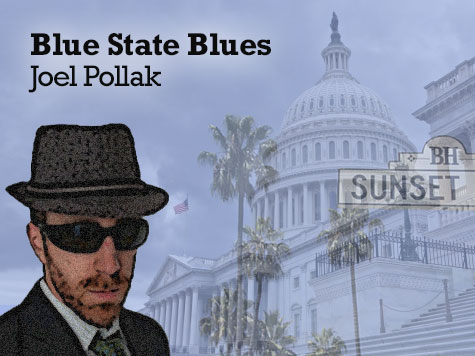The race for governor in California has become a joke–one told by the local media at the expense of the GOP.
On the one side is Assemblyman Tim Donnelly, a Tea Party conservative whose enthusiasm for the Second Amendment is such that he was once arrested for bringing a loaded gun to an airport (by accident, he said). On the other side is former U.S. Treasury official Neel Kashkari, a centrist who voted for Barack Obama in 2008.
These two are taken as representatives of the internal Republican Party “civil war”–and the punch line is that they are fighting for second place.
Donnelly, with 17% in the last poll, was far ahead of Kashkari, who was polling lower than the margin of error. Yet Kashkari has been able to gain recent media traction by casting Donnelly as an extremist. Indeed, his campaign is now pitching itself as a vote for a more moderate GOP.
This week, my friend Peter Berkowitz of the Hoover Institution made a conservative case for moderation, in response to Bill Kristol’s “call to arms” for conservatives to become more aggressive. Berkowitz defines “moderation”–a highly contested term in conservative circles these days–as “honoring the abundance of worthy but conflicting instincts, attitudes, and principles to which conservatives are fortunate to be heir.”
Berkowitz invokes a “traditional” conservatism, in which “maintaining public order and honoring duty” comes before “the protection of rights.” He is concerned that in the rush to fight for individual liberty, conservatives risk damaging the institutions we hold most dear. (In the background, there are the echoes of debates about the government shutdown of 2013, as well as foreign policy: Berkowitz singles out Rand Paul’s libertarianism.)
The term “moderation” could imply an ideological shift, compromising with Democrat policy priorities such as government health care, unconditional amnesty for illegal immigrants, restrictions on free speech, and so on–though it is not clear Berkowitz means “moderation” in that sense. A better virtue may be “prudence,” which simply denotes caution–and, in a political context, refers to strategy and tactics rather than ideas and goals.
In The Conservative Mind: From Burke to Eliot, Russel Kirk tells the story of how John Randolph and John C. Calhoun ignited a political fire in the antebellum South with their stirring defenses of Southern conservatism–and in the process helped inspire a war that devastated the society they had aimed to preserve. (Though Kirk observes that many who fought did not do so to preserve their principles, but merely to keep their slaves.)
“Randolph passionately denounced the democratic proclivity to enlarge the sphere of positive law; Calhoun defended the rights of [political] minorities,” Kirk notes. Yet their conservatism “hurried the Southern states along the road to the Civil War, which in five years did more to extirpate Southern society than a generation of civil domination by the North could have effected.” They “left no disciples really worthy of their preceptors.”
Kirk notes that many of the principles Randolph and Calhoun defended remain sound. Yet they “did not employ to the full that transcendent conservative virtue of prudence which [Edmund] Burke so often commends.” The “great majority of Southern people” never understood Randolph and Calhoun’s ideas beyond the fact that states’ rights meant keeping slavery–and later generations would again abuse the states’ rights doctrine in the South.
There is no inherent link between states rights and racism–just as there is no inherent link between statist economic policies and racism, even though the Progressives of the early 20th century who favored government control of the economy also frequently supported segregation as a legitimate exercise of government power. (Indeed, as David A. Bernstein points out, the side favoring individual liberty was more often against racism.)
Yet the vehement conservatives of the antebellum South not only doomed the genteel virtues of their society, but also tarnished, unwittingly and by association, the noble constitutional principles they harnessed to their cause. By the time Barry Goldwater–who opposed segregation personally–tried to mount a criticism of civil rights laws on constitutional grounds, the very idea of federalism had come to seem vaguely unsavory, to many.
The question for conservatives today is not how to water down their ideas–not when doing so means giving up on the fundamental principles that sustain the movement and the country itself. Putting illegal aliens on a path to citizenship before the border has been secured, for example, undermines the rule of law that makes the U.S. a place worth immigrating to in the first place. There is no practical, or palatable, way to moderate that position.
And yet some ways of defending that stance that are more prudent than others. That is why many conservatives are vocal in their support of legal immigration. Aside from the inherent virtues of legal immigration, opposition to any immigration could very well deliver total amnesty.
The GOP is big enough for both Kashkari and Donnelly. It already has the diversity Berkowitz praises. What it lacks is prudent leadership that can unite both.

COMMENTS
Please let us know if you're having issues with commenting.